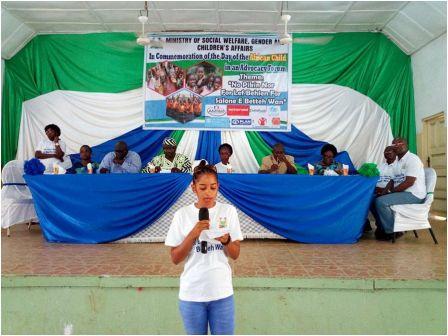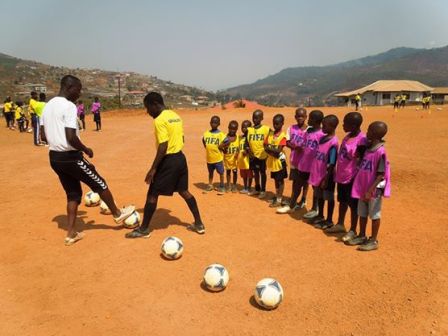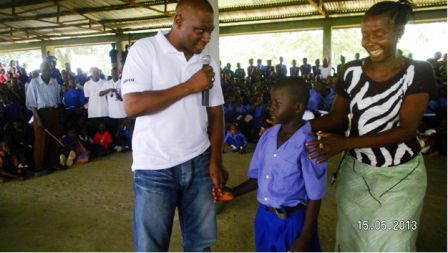Day of the African Child: The Unending Plight of African Children
Africa observes the Day of the African Child, in memory of thousands of black school children who were maimed and killed in the 1976 Soweto uprising, as they took to the streets to protest the inferior quality of their education and to demand their right to be taught in their own language.
To honor the memory of those killed and to meet the Millennium Development Goals (MDGs) relating to the welfare and safety of African children, the UN Millennium Campaign is calling on African states, civil society organizations and the private sector to tackle child and maternal mortality, school dropout rates, gender inequality in universal primary education and poor standards of quality in universal primary education.
As many as 50,000 African children under the age of five will lose their lives as the result of preventable or curable diseases. And as many as 38 million children of primary school age in Africa still remain out of school.
“Child survival, protection and development are not only universal aspirations enshrined in the MDGs; they are also human rights issues ratified in the International Convention on the Rights of Children and the African charter on the Rights and Welfare of the Child,” said the UN Millennium Campaign Communications Coordinator for Africa and Acting Deputy Director for Africa, Ms. Sylvia Mwichuli. “Investing in the health and education of African children and their mothers is a sound economic decision and one of the surest ways for a country to secure its future. Reducing child mortality and ensuring universal primary education requires strong political commitment.”
From Sierra Leone to Ethiopia, Angola to Mozambique, an average of more than one in every four children die before the age of five. In Liberia, Mali, Chad, Equatorial Guinea, the Democratic Republic of Congo and Burkina Faso, the figure is more than one in every five children.
Even in Africa’s biggest and most developed countries, scores of children die before their fifth birthdays: in Nigeria 191 of every 1,000 children die by the age of five; in Botswana it is 124; and in Kenya it is 121.
Compounding the problem, while official reports indicate that children are now better off than they were ten years ago and can look forward to living beyond the age of five, their mothers still die while bearing them, consequently denying them parental care.
Whether it’s the mother or her baby that dies, life shouldn’t be lost in avoidable circumstances. No mother wants to produce a child for death to grab, nor does any baby wish to grow up an orphan, or come to life at the expense of the mother.
Even an African child who lives beyond his/her fifth birth day can be denied education as the result of hunger, disease, discrimination and/or inadequate facilities.
Although official reports like the UN Millennium Development Goals 2008 report show that there is widespread progress in primary school enrollment, user fees – for items such as uniforms, stationery and meals – as well as armed conflict, lack of birth registration, child labor and HIV/AIDS still keep about 38 million African children of primary school age out of school. The conditions are more devastating for girls; the higher the ladder of education, the wider their rate of dropout.
According to the UN Millennium Campaign Policy Associate, Thomas Deve, “To ensure that more vulnerable and marginalized children are enrolled in and remain in school, targeted programs and interventions aimed at poor households such as setting up satellite schools in remote areas, eliminating school fees, providing school meals, constructing separate sanitation facilities, ensuring a safe school environment and promoting later marriage must be designed and implemented across countries that lag behind on the MDG targets.”
Time and again, it has been proven that when political commitment is present, the results are often significant. Countries like Rwanda, Malawi, Zambia, Uganda, Kenya and Ghana are good cases. Malawi, for example, has moved from a hungry country to a regional food supplier in recent years. It is only second to Costa Rica globally in reducing child mortality by more than 1/3 in the past three years!
Zambia has made great strides in HIV testing, prevention and education after President Mwanawasa declared a national emergency in 2004. By the end of the year, he had surpassed his goal of providing 10,000 citizens with antiretroviral treatment. The government has also focused on integrating HIV/AIDS education into the public school curriculum.
When it seemed impossible for pastoral communities in Kenya to access education, the government designed mobile classrooms in which the children of nomads access education as they wander about in search of water and pasture for their cattle.
In all of these cases the reason for success has been the country’s political will.
Stay with Sierra Express Media, for your trusted place in news!
© 2011, https:. All rights reserved.






